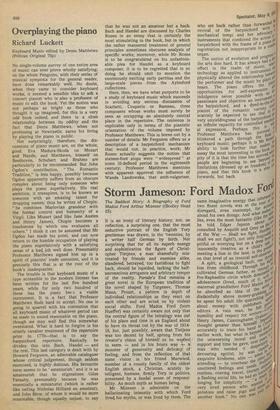Overplaying the piano
Richard Luckett
Keyboard Music edited by Denis Matthews (Pelican Original 75p) No single-volume survey of one entire area of music can ever prove wholly satisfying; on the whole Penguins, with their series of musical symposia for the general reader, have done remarkably well. No doubt, when they came to consider keyboard works, it seemed a sensible idea to ask a concert pianist who is also a professor of music to edit the book. Yet the notion was not perhaps as bright as those who thought it up imagined, for this is a very odd book indeed, and there is a close relationship between its oddity and the fact that Denis Matthews, when not professing at Newcastle, earns his living by playing the piano in public.
Not surprisingly, therefore, the dis cussions of piano music are, on the whole, good. Eva Madura-Skoda on Mozart and Haydn, and Matthews, himself on Beethoven, Schubert and Brahms are particularly to be recommended. But John Ogdon's contribution, "The Romantic Tradition," is less happy, possibly because Ogdon apparently suffers from an obscure complex about being only someone who plays the piano superlatively. His real ambition, it transpires, is to be known as someone with an amazing talent for dropping names; thus he writes of Chopin: "he combines Marlovian grandeur with the formal control and humanity of a Virgil. Like Mozart (and like Jane Austen and Henry James), Chopin becomes a touchstone by which one evaluates all others." I think it can be assumed that Mr Ogdon has made his point, and can now return to the humble occupation of playing the piano superlatively with a satisfying sense of a bad job well done. Presumably Professor Matthews signed him up in a spirit of pianists' trade unionism, and it is precisely this that is at the root of the book's inadequacies.
The trouble is that keyboard music of a type accessible to the modern listener has been written for the last five hundred years, while for only two hundred of these has the piano bec a a viable instrument. It is a fact that Professor Matthews finds hard to accept. No one is going to quarrel with his contention that all keyboard music of whatever period can be made to sound reasonable on the piano, though we may well find this somewhat overstated. What is hard to forgive is his utterly cavalier treatment of the repertoire prior to 1770—that is to say the harpsichord repertoire. Basically he divides this into Bach, Handel — and the rest. This last category is dealt with by Howard Ferguson, an admirable cataloguer whose critical judgement, though seldom exercised, is highly dubious. His favourite term seems to be ' amateurish ' and it is as amateurish that he stigmatises Giles Farnaby, presumably because he was essentially a miniaturist (which is rather like calling Nicholas Hilliard an amateur), and John Blow, of whom it would be more reasonable, though equally unjust, to say that he was not an amateur but a hack. Bach and Handel are discussed by Charles Rosen in an essay that is certainly the most stimulating in the book, but in which the rather mannered treatment of general principles sometimes obscures analysis of specific works; moreover, while Mr Rosen is to be congratulated on his unfashion able plea for Handel as a keyboard composer, it is to be regretted that in so doing he should omit to mention the enormously exciting early partitas and the large-scale pieces from the Aylesford collections.
Here, then, we have what purports to be a study of keyboard music which succeeds in avoiding any serious • discussion of Scarlatti, Couperin or Rameau, three composers whose works must surely be seen as occupying an absolutely central place in the repertoire. The omission is explicable only in terms of the pianistic orientation of the volume imposed by Professor Matthews. This is borne out by a number of details; Mr Ferguson offers us a description of a harpsichord mechanism that would not, in practice, work; Mr Rosen actually suggests the notion that sixteen-foot stops were "widespread " at some ill-defined period in the eighteenth century; Professor Matthews mentions with apparent approval the influence of Wanda Landowska, that arch-vulgariser, who set back rather than forwarded tlit; revival of the harpsichord with II,' mechanical tempi and her advocacr8 instruments that combined the action olo harpsichord with the frame of a pialfria; registration not inappropriate to a e..-e organ. The notion of evolution and progresclifilf" the arts dies hard. It has always had akert effect in the realm of music, W"ho technology as applied to instruments ,ep physically altered the relationship betsv;ij the performer and the music he PlaYsid hears. The piano offers the P'",:„,; opportunities for self-expression clis, indulgence never possible with 50 05 passionate and objective an instrumen0! the harpsichord, and a dyed-irethe:,00 pianist of the romantic variety tte scarcely be expected to see that very unyieldingness of the harpsichorati'01, an infinite capacity for controlled eal°0 al expression. Perhaps this is , so Professor Matthews has pursuo of , blinkered a path through the Leil's keyboard music; perhaps it is Mr ability to look further that Make,.s. essay the most interesting in the boolcyt pity of it is that the time has arrived; people are beginning to see beY°11 f ei limitations (dressed up as freedom) ° riot piano, and that this book is a steP forwards, but back.










































 Previous page
Previous page